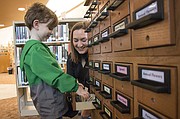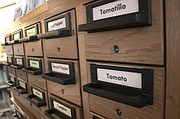Something seedy is going on at Cd'A library
COEUR d’ALENE — When Max Palmer was at the library Wednesday afternoon with his mom, he found a treasure chest full of goodies. There were 45 drawers full of seed-packets waiting to be taken home. The 4-year-old was mostly interested in the broccoli and some herbs.
The seed library in the Coeur d’Alene Public Library got a face-lift two weeks ago. Jessica Mannon, a community garden volunteer, organized the re-invention of the seed library to be more interactive and community oriented.
“We’ve developed this into a more educational library, so we really want to teach our community to save seeds, how to backyard garden, organic garden and those kind of essential things,” Mannon said. “I believe it makes a stronger community.”
People can “check out” seeds to plant in their gardens for free, and, hopefully, will cultivate the seeds from their plants and return them. Seed sharing is a lost culture that a lot of people around the country are trying to bring back, including Mannon.
The new seed library, named True to Seed, has about 50 varieties of fruit, vegetable and herb seeds for people to take home. There is a membership log where people write down their names and what seeds they are checking out. There is also a lot of information available about gardening and harvesting seeds.
People can check out five seed packets a month. This way, Mannon said, no one is hogging all the seeds and it brings a lot of people trickling into the library. She wants to keep records of what seeds people check out so she can keep the most popular ones restocked. Her goal for next year is to create an actual inventory and start classes about saving seeds.
“The excitement and the response I’ve been getting about this is so positive and so overwhelming and people want to get involved,” she said. “People are excited about this.”
The True to Seed library only carries regionally adapted seeds, meaning the seeds have grown in Washington, Oregon, Montana and Idaho. A lot of seeds from seed catalogues were grown on the East Coast and won’t grow very well here because they are not acclimated. The growing season here is cooler and shorter, so seeds not adapted to those conditions will not produce good quality plants, Mannon said.
“Our goal was to create a bank of locally acclimated seeds for our communities to be able to get seeds that will grow here,” she said.
The seed library is also a resource for low-income families who can’t afford to buy seeds to start a vegetable garden.
“I think we are coming to a day and age where this is important, with food security and GMOs, people are freaked out about it,” Mannon said. “I think this gives them a little hope that we do have empowerment over our food system and we can do something.”
Mannon put a lot of work into the new seed library. She researched how different seed banks around the country operate, she made posters and brochures so people could use it on their own and she got seed companies from the area to donate about 1,000 seed packets to get it started.
She also started a “Grow Out” program, where the current seven participants are growing different varieties of seeds and will learn how to correctly grow them so they do not become cross-pollinated. The seed library only wants true-to-type seeds.
Next year Mannon wants to start orientation classes where people can learn about isolation distances and how to collect and dry seeds properly.
Sorensen fifth-grade teacher Katie Palmer, who was at the library Wednesday with her son, Max, suggested it would be a good program to bring into the schools.
“It’s a good way for kids to learn about science and where their food comes from,” Palmer said. “Any connection I can find between science and community is huge.”
In the meantime, the True to Seed seed library is open to anyone who wants to start a garden. It’s located inside the Coeur d’Alene Public Library, has a page on Facebook called True to Seed Coeur d’Alene Seed Sharing Public Library and will soon have a website.
“I have such a passion for seeds,” Mannon said. “Nothing would exist on Earth without seeds.”





